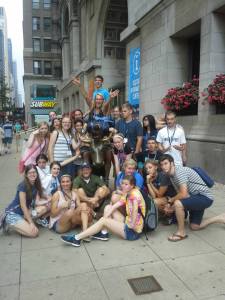And the Lord God said, “Now that the man has become like one of us, knowing good and evil, he must not be allowed to stretch out his hand and take also from the tree of life and eat, and live forever.” -Genesis 3:22
We regularly attempt to define “life” in our society (both at its beginning and end) in material terms. A man or woman being shaped in the womb is “an embryo” until they develop all their parts, and a human-being on a hospital bed is “alive” as long the heart can be made to pump. These definitions leave the meaning of “life” (literally, the meaning of the word) in fuzzy terms, yet we still struggle toward making it an eternal condition for those who have it now and cry out “tragedy!” when, in our minds, it ends too early. We suspect there is something worth cultivating and preserving in life, but it is something we’re more concerned and excited about keeping for ourselves than we are about the potential to give life as it has been given to us. This is the curse of the sinful heart: we believe we can snatch out of God’s hand and hide His gifts from others, when—even in our sin—God is freely offering life and knowledge of Him to all.
I’m thinking about this for many reasons, but it is prompted in this case by an article in The Atlantic called The Fallacy of ‘Giving Up’ by James Hamblin. It has to do with the necessity for change in our relationship to death in medical practice. The article’s title is a reference to the long-standing tradition among medical professionals of treating death itself as an enemy to be fought, and labeling anyone not fighting death as having ‘given up.’ In treating a dying patient, success has traditionally been measured by the material circumstances. Conversations about the success of a particular treatment for a terminally ill patient would look something like this:
(Two doctors enter a room. DOC 1 looks over a patient’s chart.)
[DOC 1] Doctor.
[DOC 2] Yes, doctor.
[DOC 1] Is your patient dead?
[DOC 2] No.
[DOC 1] Good work.
(They shake hands. Curtains.)
The life of the person doesn’t come into the conversation. The question is, “Is the patient dead yet?” and as long as the answer is “No,” then somehow we’re winning. If the person him or herself is essentially a vegetable, sustained only by a complex of machines operating their organs independent of the flesh itself, the patient–we are assured–is winning. If the treatment is destroying the cancerous growth, it doesn’t matter whether or not the person is being destroyed along with it, because we’re defeating the enemy, and if we’re defeating the enemy the patient must be winning. That’s how the field of medical science saw it for a long time, but Hamblin’s article brings attention to an increasingly undeniable reality that we are not winning, and fighting (at least in the case of those near death) isn’t helping. Medical professionals, specifically those serving in clinics, are being forced to ask whether they’re fighting the right battle with the right weapons or if what they’ve made their enemy is the real Enemy at all.
I don’t have a great deal that is worthwhile to say in my heart and probably even less that you’d like to hear, but the one thing I can say in this moment that feels like the fruit of the slow, painful process of sanctification I find myself going through is this: life is not a secret that must be snatched from God’s garden by the power of our craft, so please do not, at any point, let the methods, models, plans, patterns and procedures set forth to you by those in your field distract you from the way, truth and life around which all things are organized, within which all things are held together and through which death is defeated / life comes into the world. There is nothing more powerful than God’s Word. Know that, and you will not lose sight your enemy, wherever it arises, in whatever form.


